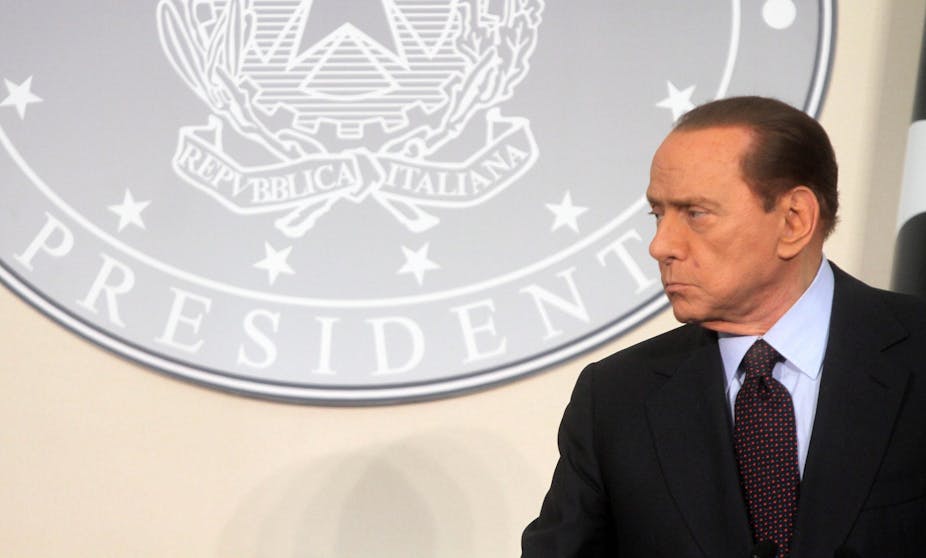The move by international ratings agency Moody’s to cut Italy’s credit rating for the first time in two decades will do little to ease concerns about the Eurozone’s debt crisis, despite global markets climbing on news EU finance ministers met to discuss emergency bailout measures for the region’s banks.
But will it prompt appropriate, targeted action by Prime Minister Silvio Berlusconi and his government? Recent experience suggests that it will not.
Moody’s decision to downgrade Italy’s rating by three notches to “A2” comes two weeks after Standard & Poor’s cut its own rating for the country.
S&P also lowered its growth projection for Italy to an 0.7% annual average for 2011 to 2014, from a prior projection of 1.3%.
It also hinted at another downgrade within 18 months if the government is unsuccessful in paying down its overall debt to below its current level of 120% of gross domestic product (GDP).
The slowing economy will make it harder for Italy to achieve its fiscal targets – a situation made worse by the fact that Italy has the second highest public debt to GDP level in the EU after Greece.
These credit downgrades will make investors wary of buying Italian bonds, and so the country will forced to increase the level of interest it repays. This means cost of raising capital will become more expensive, so Italy, like Greece, could take decades to climb out of debt.
People living in Italy know there is reason to be concerned. But possibly more concern is being expressed by Italian banks, foreign onlookers and external financial markets.

The government’s second austerity budget, approved in the parliament in September, provided greater levels of anxiety to the markets because the cuts to regional and local governments seemed arbitrary, dramatic and ultimately costly for industry and infrastructure.
S&P’s statement justifying its downgrade was short and simple. The downgrade was motivated by Italy’s political situation and its debt.
These are the two most negative features of Italy’s economy that Berlusconi and Finance Minister Giulio Tremonti have been unable to confront.
The latest austerity measures are designed not only to placate the markets but also to project a balanced budget by 2013, with a reduction of 3% of spending in regional and local governments over the next three years. With the economy already in decline and tax receipts falling, this seems simply implausible.
After the announcement of the S&P downgrade, the Italian government claimed the ratings agency’s actions were “politically motivated” and announced at a time when it is struggling to assuage investor fears that the country might be forced to default on its sovereign debt.
In a statement, the Italian government said S&P put more stock in newspaper reports than on the government’s 54 billion euro austerity package, plans for further belt tightening in the future, and a vow to balance the country’s budget by 2013.
Most of Italy’s underlying weaknesses has already come to a head. Piecemeal austerity measures at this late stage, with limited financial credit capacity, makes economic decline inevitable.
With little or no economic growth, higher levels of unemployment are certain. Debt servicing and repayment become will difficult.
Meanwhile, the government and its leader are simply too fragile a coalition and far too distracted on sideline issues to meet the economic rigour required of the moment.
Berlusconi continues to face ongoing allegations of unethical behaviour – including that he paid for sexual favours – which have only exacerbated the unravelling of the government’s power.
Panic has not set in within Italy, although the first serious signs of anger and protests are beginning to surface.
Union demonstrations have begun as the impact of the of the austerity measures on jobs becomes apparent.
As Berlusconi continues to suggest a international political conspiracy against himself and his government, precious time for action is running out. The credit agencies might well be sounding the final alarm bells.
In some respects, the markets have also acted as form of protest against the complacency of the government and its inability to act without political prejudice and effectiveness.
It is most distasteful that the fall of Berlusconi government might come about through pressure from outside of Italy, rather than directly from the electorate. Italy is merely a victim of personal political ambitions and hardheadedness.

